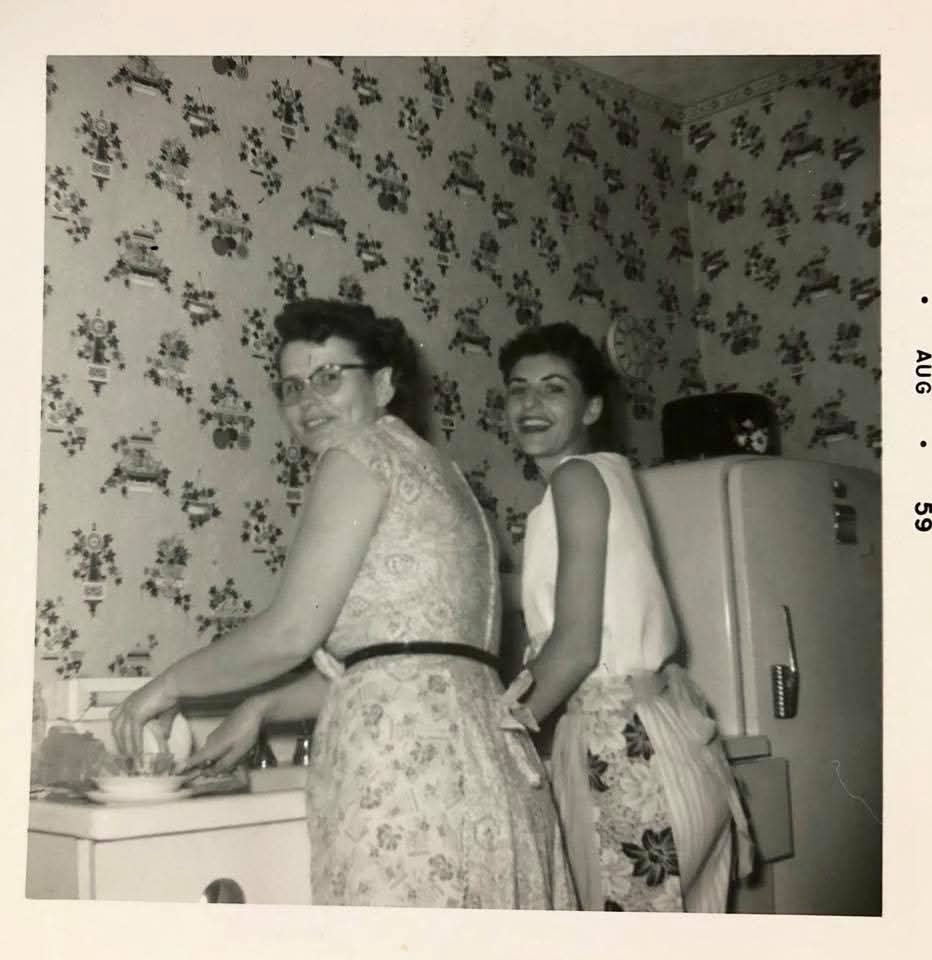
Caring for Your Heirloom Apron
Heirloom items connect us to the past in a tangible way. They carry stories, traditions, and love across generations. Among these keepsakes, heirloom aprons hold a special place. They were often worn while making meals from scratch, hosting celebrations shared at the table, or going about everyday routines. Some of my favorite childhood memories are waking up super early when sleeping over at my grandparents' house, sitting on the tall kitchen stool, and watching my Grandma bake. There was always an apron over whatever she was wearing to protect her clothes.
This guide is here to help you care for your apron so it lasts, in both fabric and memory. Hand washing and air drying are the best options, but they're not always the most practical. Before you begin cleaning or storing your apron treasures, it helps to know the fiber content.
Common Fabrics used to make Aprons:
- Cotton – A sturdy, breathable choice, often used in mid-century aprons.
- Linen – Lightweight but strong, known for its crisp feel.
- Vintage Blends – Often a mix of rayon, polyester, or other fibers. These can be more delicate.
Hand-Washing vs. Machine-Washing:
- Hand-washing is recommended for older, fragile aprons or those with lace, embroidery, or fading fabric. Let the fabric soak in a gentle cleanser for 10 to 15 minutes, then lightly wash it by hand. Be sure not to agitate the fibers too vigorously, as sometimes this can cause tearing of the fragile fibers. Rinse well in cool water. Very gently, squeeze out the water. Do not twist or pull. If needed, place items between dry towels and roll out excess moisture.
- If machine-washing, use the gentlest cycle, cold water, and perhaps a mesh laundry bag. Modern aprons (future heirlooms) are usually strong enough to handle modern laundering methods. It still makes sense to treat the apron as gently as possible for the longest-lasting results.
- Choose mild, fragrance-free laundry soap, or a homemade vinegar/water/borax solution. Avoid bleach, fabric softeners, and anything with strong chemicals — they can weaken fibers or alter colors.
Drying:
- Air drying is the safest method. Lay flat on a clean towel or hang outside in the shade.
- Tumble dryers can shrink or wear down the fabric, so use them at your own risk. If you choose to tumble dry, remove the fabric from the dryer while the apron is still damp.
- Always keep vintage textiles out of direct sunlight, which causes fading over time.
Ironing:
- Use a low to medium heat setting, depending on the fabric. Ironing the apron while it is still slightly damp will help remove wrinkles.
- Always test an inconspicuous corner first to see how well the fibers react to the heat of the iron.
- A pressing cloth (or a clean cotton handkerchief) laid on top of the apron helps prevent shine or scorch marks from the iron.
Heirloom Apron Storage:
- For most vintage aprons, folding with acid-free tissue paper between the layers is ideal. It cushions the folds and helps prevent creases from becoming permanent.
- No regular paper, cardboard, or wood should touch the stored linens. They WILL leach acid into the fabric over time leaving a permanent stain.
- Hanging vintage linens works too, using padded hangers to avoid stretching.
- Store vintage textiles in a cool, dry place. Consider storing vintage aprons in a pillowcase to protect the fabric from dust and light.
- Avoid plastic bags, which trap moisture and promote mold and mildew during storage.
- Never store linens in humid places such as basements or attics.
- Cedar blocks or lavender sachets help deter moths, but avoid direct contact with the fabric.
Honoring the Past and Creating New Memories
An heirloom isn’t just something to put away and never look at again— it’s something to use and honor.
- Wear it for family holidays, birthdays, or quiet Saturday mornings.
- Create a photo album of loved ones through the years wearing their lovely aprons.
- Share the story behind your keepsakes with kids or grandkids.
- Write down its history and include a note with the apron for whoever gets it next.
My most vivid apron memories are of the 1970s double-knit cobbler aprons my Gram made for herself, because I think I saw those the most. I do have a few cotton aprons that were either my Gram's or maybe my Great Grandma's (a memory kept by my Gram) that I will cherish forever.
Consider buying a new *heirloom quality* apron from my shop to enjoy now (making new memories) and perhaps pass on the tradition to your kiddos.
Additional Resources
- The Care and Keeping of Textiles by Mary Humphries
- Smithsonian’s Textile Care Guide (online)
- Vintage apron communities on Reddit or Facebook



